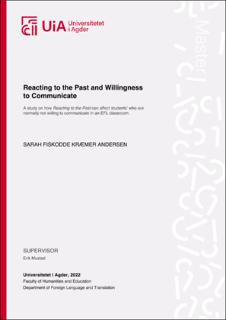Reacting to the Past and Willingness to Communicate
Master thesis
Permanent lenke
https://hdl.handle.net/11250/3036544Utgivelsesdato
2022Metadata
Vis full innførselSamlinger
Sammendrag
This thesis investigates how the American immersion pedagogy Reacting to the Past (Reacting) affects students who are normally not willing to communicate (WTC). An English as a foreign language (EFL) classroom includes students who find it challenging to communicate in their second language (L2).To gather data, I have collaborated with three other MA students. With these students, we have adapted a Reacting game, “Ending the Troubles: Nationality, identity, discrimination, and the Search for Peace and Democracy in Northern Ireland, 1997-98”. We conducted an intervention in one 10th grade in Norway. In addition to the game, I conducted two digital surveys, seven student interviews, and two interviews with the class teacher together with one of the other MA students. Using qualitative and quantitative methods, mixed methods, provide a richer data collection which collect both statistical and empirical data, in addition to human observations. Conducting a case study is time-consuming and challenging. However, I experienced it as rewarding and exciting.This thesis provides examples of how Reacting to the Past and the Willingness to Communicate theory (WTC) share elements that engage students. Students in this study found the pedagogy rewarding, fun, and interesting. Several students became immersed in the game as well as orally active. Learning in a social environment provides the students with listening and communicative skills. The students learn to communicate their opinions and listen to their peers’ opinions.The game was adapted in the fall of 2021, and the classroom intervention happened in the spring of 2022.
